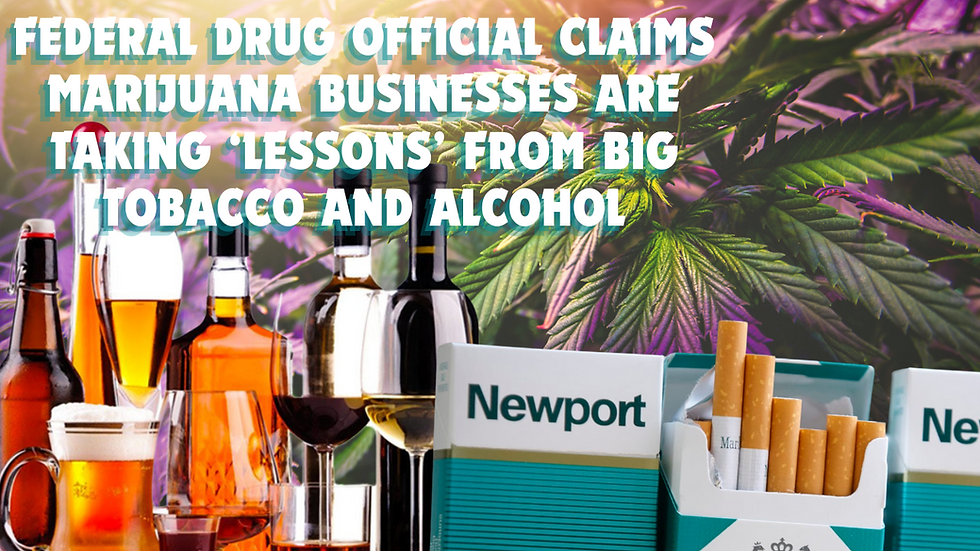Top Federal Drug Official Claims Marijuana Businesses Are Taking ‘Lessons’ From Big Tobacco And Alcohol
- Jason Beck

- Oct 2, 2024
- 3 min read
A top federal drug official is pointing out that the marijuana industry seems to have learned a few marketing tricks from the alcohol and tobacco industries.

OG Article: here
View our Fair Use Policy: here
According to Nora Volkow, the director of the National Institute on Drug Abuse (NIDA), the fastest-growing group of cannabis users is people 65 and older, and they’re being “targeted” with messaging that promotes the therapeutic benefits of cannabis.
In a blog post last week, Volkow shared her thoughts on how commercial interests are playing a big role in increasing drug use and substance misuse. While she has long expressed concerns about the problems with criminalizing drug use, she took aim at the commercial marijuana market, which has expanded significantly as more states legalize cannabis.
Volkow pointed out that while health agencies have made strides in reducing the use of substances like tobacco, the legal marijuana industry has created “new opportunities for commercial interests to drive drug consumption across all ages and demographics.”
She gave an example of how cannabis products are often packaged in ways that appeal to younger people. “Cannabis products are often sold in colorful packages that mimic kid-friendly snack foods, for example, making them appealing to children and to young people,” Volkow said. “Adolescents exposed to cannabis marketing have greater odds of using the drug. The legalization of cannabis by the states and the diversification of cannabis products have led to significant increases in the number of users and the amount of cannabis consumed by them in the U.S.”
Interestingly, Volkow has previously acknowledged that youth marijuana use rates haven’t spiked, despite her concerns about legalization. In fact, multiple federally funded surveys back that up. But in her latest blog post, she shifted the focus to young adults, noting that the 18-30 age group has the highest cannabis usage rates. She also highlighted a surprising trend—the rise in cannabis use among older adults.
“This older age group is being targeted with advertising touting cannabis’ alleged therapeutic benefits,” Volkow said. “As expected, the expanded use of cannabis and the higher doses used have resulted in an increase in the number of individuals suffering from adverse health consequences from these exposures.”
One of the issues, Volkow argued, is how marijuana is marketed in states that have legalized it. She pointed out that “lessons learned from alcohol and tobacco are also being applied to the sale, marketing, and taxation of cannabis products in states that have legalized the drug for adult use.” She said that policies around cannabis vary widely from state to state, drawing a parallel to what some call the rise of “Big Marijuana.”
Volkow stressed the need for more research to fully understand both the risks and potential therapeutic uses of cannabis. “Needed is much more research to understand the potential risks and therapeutic applications of cannabis and to inform policy approaches that minimize cannabis’s harms, reduce the social and racial inequities associated with its criminalization, and ensure safe access for those who may benefit from it therapeutically,” she said.
She also sounded a warning about businesses putting profits before public health. “History has shown that businesses often put profits over public health, too often with tragic consequences. As we confront the rapidly evolving landscape of addictive and potentially addictive products and technologies, it is imperative that we conduct research to understand how commercial interests affect public health and individual health and well-being. Such research can help guide policies as well as inform the development of evidence-based prevention and treatment interventions,” Volkow said.
Volkow’s concerns about the risks of a commercial marijuana market aren’t new, but cannabis advocates argue that the legal, regulated markets have been successful in preventing underage cannabis use. With systems like ID checks in place, they feel these safeguards are working.
Still, Volkow remains firm that criminalization isn’t the answer. She’s previously said that the war on drugs has “created a structurally racist system” where Black people are treated “worse” than others. She’s also called for a shift “away from criminalization,” pointing out that the lack of drug treatment for incarcerated individuals is worsening the opioid overdose crisis.














Comments